Winter 2021
Healer, Hunter, Mentor, Mom
Chelsea Cassens ’08 wants her eastern Oregon community to stay healthy. She works toward that goal as a nurse and advocate for the protection of public lands.
- Story by Tracy Ross
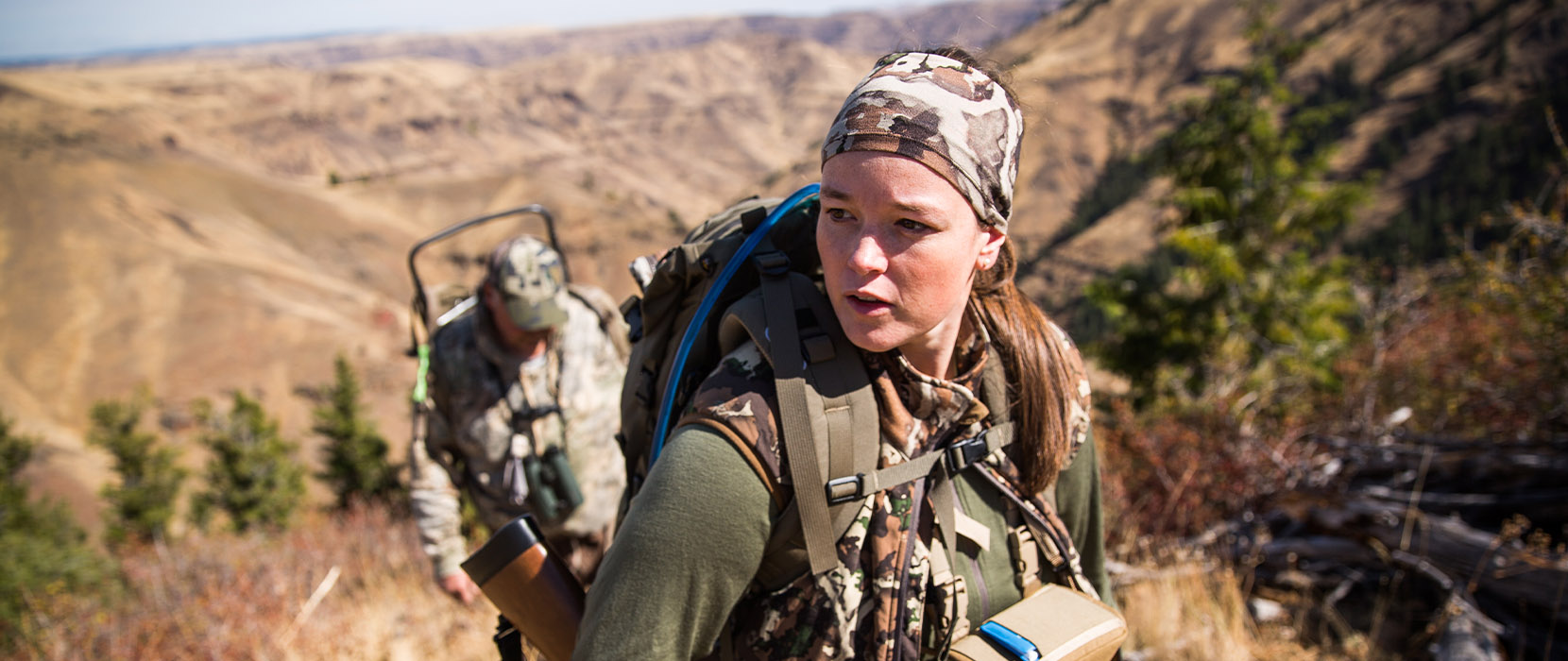
Photos by Max Whittaker
ALL THESE MONTHS into the pandemic, Chelsea Cassens, a nurse at Grande Ronde Hospital, has started to notice something new about her regular patients.
Their treatments are the same. The patients she works with on the oncology floor, for instance, still need to come in for their chemotherapy and antibiotic infusions, even when COVID-19 cases have surged, as they did back in December, in La Grande, Oregon (population 13,000), and her nearby hometown of Imbler (pop. 300). Of course these patients don’t want the increased risk of catching COVID, but they must go to Grande Ronde Hospital whether they want to or not, because it’s where they get these vital drugs.
Yet what she observes makes her all the more attentive. Her patients arrive with all of the side effects of isolation, she says; they’re lonely and sad. They tell her, “You’re lucky you get to come into work every day, to see people and interact.” Yes, Cassens enjoys this part of her occupation. But she also wants to help the patients who keep her connected with her community.
“Some don’t want to treat sadness with anti-depressants, so I encourage those that can to get outside and go for a walk. We have miles of local hiking and mountain biking trails right outside of town,” she says. And she has a visceral connection to all of the benefits—physical, mental, emotional—of immersion in nature.
In addition to being a nurse, Cassens is an outdoors-woman, a hunter. When she feels depressed—as she sometimes did after the birth of her first baby, Brynlee—she heads outdoors. When Brynlee was small, just sitting with her in the backyard grass was enough to calm her colicky cries and lift Cassens’ spirits. But the multiple wilderness areas Cassens could see from her perch—the Eagle Cap, the Elkhorn, and the Wenaha-Tucannon—and the promise of adventure she has found there for three decades, reminded her of all that she is, and all that she has been, from the beginning of her life as the great-granddaughter, granddaughter, and daughter of five generations of hunters who have roamed on, hunted on, and harvested meat on this land.
It’s a 30-minute drive to the national forest lands Cassens hunts most often. When she gets linked-together days off, that’s where she heads. Making sure Brynlee and her son, Lane, are taken care of, she joins her husband, Tanner, in loading her truck, whistling for her German Wirehair Pointer, Flynn, and driving to the mountains, where she can hunt what’s in season.
For Cassens, parenting Brynlee, 7, and Lane, 5, comes first; then nursing; then hunting. But hunting threads through nursing and being a good mother. She grew up on annual hunts, weeks long, with her extended family. She left Imbler once, to attend University of Portland’s School of Nursing. But her heritage and all that hunting gives her brought her back, and that’s when she became so much more than someone who hunts to feed her family.
When she returned to this region, she became a hunter who both takes from the land and works to preserve it through extensive conservation efforts. In some ways, she returned to her home to save it for future generations.
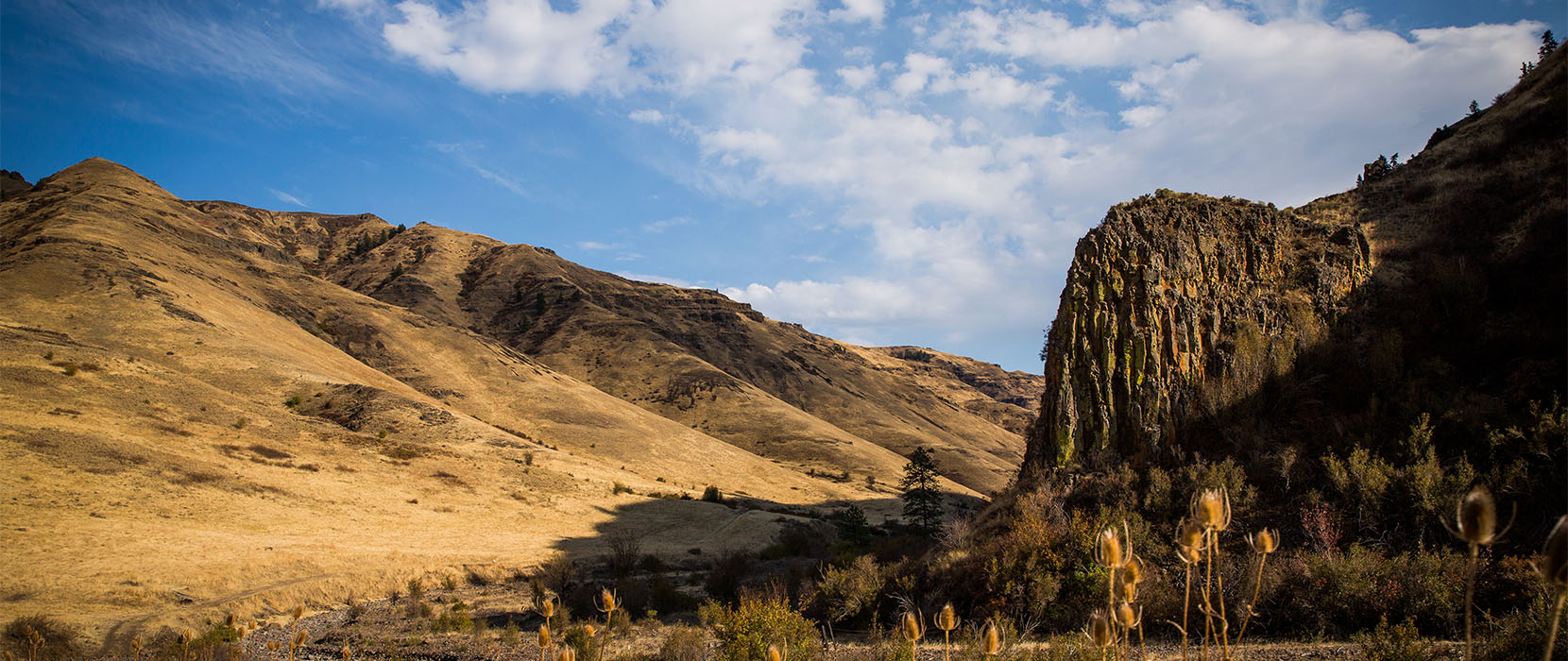
“WHERE DO WE start?” she says when someone asks her about her childhood. Usually the questions come from the “hunting curious,” like the reporter hiding the fact that he was a vegetarian who accompanied her on an elk hunt in September of 2018. Seeing as that story ran in The New York Times, she’s gained some notoriety. So she’s had to think back to her roots and what got her here.
All the generations of Hughes and Plass families who still live in Cassens’ majestic corner of wilderness-shot eastern Oregon were tied to the land in ways it’s sometimes hard to imagine these days.
Her great-grandparents rolled into the Grande Ronde Valley in the 1950s, built a home, and began raising kids. Her grandparents, Loren and Betty, grew up in a world filled with adventure: horse packing, camping, hunting, and fishing high mountain lakes. If resilience is something all parents are encouraged to give their kids nowadays, they gave it to their kids in spades. “My dad and his four brothers grew up as sportsmen in the Eagle Cap,” says Cassens. “They packed horse strings and mule strings back there and stayed for extended periods.” (Horse and mule strings are animal trains that carry loads of supplies over roadless terrain.) “My grandpa worked at a jewelry store in town, though, so when my dad and his younger brother were like 10 and 11, they’d stay in the backcountry by themselves.”
All four of the Hughes boys grew up to raise families of hunters. And for as long as Cassens can remember, their years revolved around what they could legally hunt. One of her most potent childhood memories comes from a time when her dad, Ed, hoisted her, at age 8, and her brother, age 6, into his truck for a quick drive into the Umatilla National Forest to scope for a buck. The air was crisp—early evening—and along a dirt road Ed saw his deer between them and a stand of small spruce trees. He stopped the car and told the kids, “I have a favor to ask you. I’m gonna go up and over this hill on the other side of the trees, and I want you two to walk down this little old logging road, and hopefully you’ll bump this deer toward me.”
“As he’s talking, my dad is getting his pack and gun,” Cassens continues. “Then he leaves us outside of the car. I remember my brother and me walking down this road, brushed in with trees, and we can’t see in front of us. Then we hear gunshot, and I remember sucking in my stomach. But my dad starts whooping and hollering, yelling, ‘Come on up!’ And there he is grinning ear to ear with this great buck. My brother and I held its legs while my dad skinned it. Now, the little trees where we walked are so big you’d never spot a buck out there. But still to this day, I look up there every time we drive by.”
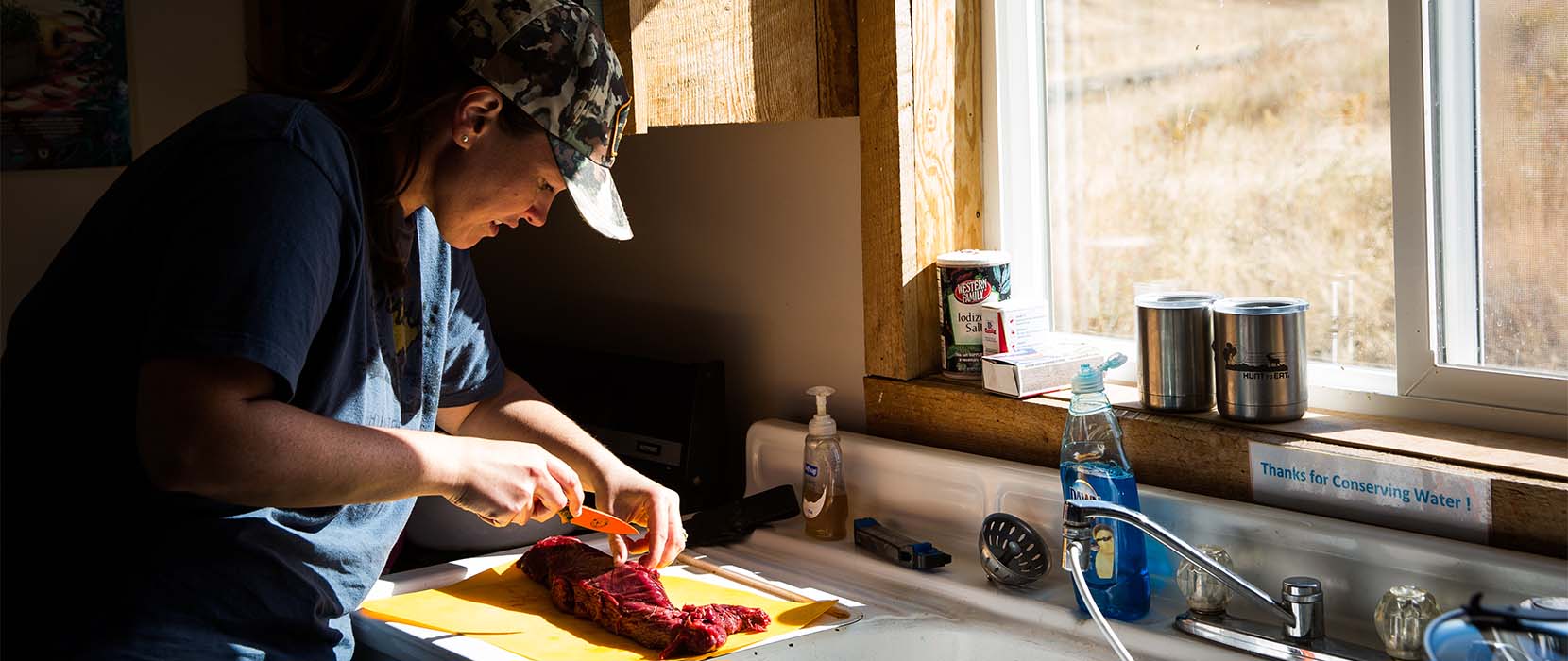
Cassens learned all of her first hunting techniques from her dad. Other family members completed her early wilderness education. For two weeks every spring, four generations of family, including great-grandparents, grandparents, parents, and oodles of cousins, would take the horse strings into the Wallowa-Whitman, set up a big, multifamily camp, and take full advantage of turkey hunting season. Often the little kids would stay with the great-grandparents while other adults hunted. Cassens’ great-grandmother Grace would hike her into the hills to study wildflowers. “I can still remember her favorite flower—the yellow bell,” Cassens says. “That tells you the impact those trips had on me. How many people learned their great-grandma’s favorite wildflower from their great-grandma?”
Her grandfather would have just as strong an impact, only later, when she was older.
SHE STILL LOVED hunting in high school; still hunted with her dad, her brother, and cousins. She says she and her dad were, and still are, extremely close. “I’ve enjoyed the opportunities I’ve had to hunt with Chelsea, and can see how the various skills I taught her have stuck with her.
She was very easy to raise, both her and her brother. Now it’s fun to be the older person at camp and watch her take care of everybody,” says Ed, her first mentor. Now, when she mentors other women hunters, she is paying it forward.
An equally influential force in her life was her granddad, Loren Hughes, who first taught her about conservation.
Being around him wasn’t all that fun at first—“He was so passionate and loud about what he believed, it could almost be embarrassing,” she says. But the man had chops: Jack Ward Thomas, head of the US Forest Service under President Clinton, wrote several books (including his latest, Hunting Around the World, in 2015), and he signed one to Hughes. It was no wonder: Hughes served on multiple conservation boards and traveled frequently to Washington, D.C., to lobby for the preservation of public lands. So many people have spoken and written admiringly about him that it’s hard to pinpoint the most affectionate missive. But this remembrance from his friend Ric Bailey paints a vibrant picture:
“The loss of every big tree, every roadless area left another wrinkle on that handsome mug. And Loren did whatever it took to stop it, and then some. In fact, during the early years of the Forest Service’s administrative appeals process, he became known as ‘Eight-Cent Hughes,’ because he stopped timber sale after timber sale with naught more than a postage stamp and a hand-written appeal. Loren was fighting for protection of our national forests...before we had NEPA (the National Environment Protection Act), the Wilderness Act, or any meaningful legal protections. He was an activist before most people even knew what an activist was.”
Though Cassens didn’t know it when she was a kid watching him dole out “iron handshakes” as he preached his religion of conservation, she would follow in his footsteps.
First, she graduated high school, got the Providence Scholarship, and left home for University of Portland. At UP, she chose nursing because she’s always loved caring for people. She says coming from a small town, UP was great because it had a cohesive feel. “The class I started with is who I graduated with. And that’s UP in general. It’s away from downtown Portland in its own small little world. I would definitely say it was challenging, but I felt the instructors and advisors kept track of students through their classes. I always felt supported and given the challenge to succeed,” she says.
But once she started clinicals and 12-hour nursing shifts, she found she needed another outlet. So Chelsea Hughes got herself a job at a Sportsman’s Warehouse, and that’s where she met her future husband, Tanner Cassens.
He was a passionate hunter who grew up in eastern Oregon, too (Pendleton). When they first met, they had so much in common she was slightly convinced they were related. So even though her dad had warned, “You’re never going to meet someone who hunts and fishes in Portland,” she had. They married in June of 2012 and found out they were pregnant that August.
Where’d they tell the family? At antelope hunting camp, naturally. Then they moved to Imbler, to be near the future grandparents.
Brynlee’s birth the following spring made them ecstatic. But even the strongest among us have no control over hormonal changes. As a new mom, Cassens found herself “a little blue.”
She longed for her old self—the one who was “active and outside and doing things and having my own life,” she says. What’s more, Brynlee wasn’t a great sleeper or eater, and she cried a lot. The one place that could consistently calm her was the patch of grass in the backyard where Cassens still goes to get perspective on her life. But Brynlee’s fussing was about to bring Cassens a gift.
AROUND THE TIME of Brynlee’s birth, national conversations about public lands protection were heating up. Simultaneously, the idea that the public owns public lands was taking root. That year, the organization Backcountry Hunters and Anglers (BHA) released its “I am a public land owner” campaign, showcasing the terminology of federal lands and emphasizing that they are for the people. Cassens had what might seem like a strange epiphany given her upbringing. She began to see that the idea of the public owning the land wasn’t just theoretical—in fact all Americans had a stake in it. They paid taxes to fund the agencies that managed it. And they had a say in what happened to the ground itself and the animals roaming upon it.
BHA encouraged its constituents to post pictures of themselves enjoying the land, and soon thousands of hunters and anglers answered the call. Cassens saw herself in the photos of hunters in the draw between two mountains, waiting for a herd of elk to come their way; she could identify with snapshots of fishermen at the edge of a shimmering river casting a fly for the trout they knew lurked under the surface. These images showed Cassens viscerally what her Grandad Hughes had been fighting for before and during her youth. And once she “got” it, she started fighting for it too.
Next, she started educating herself about threats to public lands, such as what can happen when Bureau of Land Management (BLM) or US Forest Service lands are transferred to individual states. “Once the state manages the land, what could happen to it is more up in the air than when the federal government owns it,” she says. “A state has to run on a balanced budget, and there’s a lot of history to show that states will sell their real estate to private industries or owners who have billions of dollars.” Those entities can then sell the land to whomever they want, and they often cash out to oil- drilling or logging companies.
Then, in November of 2016, she and Tanner had an encounter that would dramatically deepen her involvement in conservation.
It involved a once-in-a-lifetime big-horn sheep tag Tanner had finally drawn within the John Day River canyon. (Tags are permits that allow a hunter to pursue certain animal types, typically big game such as deer, elk, bear, cougar, and antelope. One tag equals the right to harvest one animal, and they are limited based on supply of species in a given area. Some tags are so limited they are once-in-a-lifetime tags.)
Tanner determined that the best way to access the area he would hunt was by raft, on the water. It’s a true adventure, floating along while hunting the river canyon’s cliffs and rock faces. Public lands line both sides of the river, and its waters are public. But there were limited access points to launch a boat. Where Chelsea and Tanner wanted to launch, the access point was being leased by a hunting guide who wanted to charge them $2,000.
What the guide failed to tell them was that his restrictions were limited: He could charge people to launch the day before the season started, the day it started, and the day after, but Chelsea and Tanner were launching days before that range. They discovered this foul by talking to local Fish and Game biologists and to representatives from the BLM and Western Rivers Conservancy, and they were able to launch without paying the outrageous fee. But they both now had firsthand experience with a private entity (the land lessee) attempting to restrict access to a public resource (the river), and it strengthened Cassens’ commitment to be a vocal advocate for conservation.
First, she became a member of BHA— “basically seven men sitting around a campfire advocating for public lands— which grew into a national movement,” she says. Then, she became a board member and life member for the Oregon chapter of BHA. In 2018, she joined BHA members from across the nation on a trip to Washington, D.C., where she lobbied her state representatives to pass the Land and Waters Conservation Fund (LWCF), essentially a renewable $900 million cash font from taxes on offshore drilling that funds everything from soccer fields to river access to cleaning restrooms in public places.
BHA’s executive director, Land Tawney, says, “When I first heard about Chelsea, the person telling me was glowing. Chelsea jumped right into BHA, flying to D.C. The LWCF’s success had many mothers and fathers, but Chelsea is one of the main mothers that got this thing funded.”
Cassens went not only for the land but for her family. In 2018, she joined an initiative to spread the word to hunters that lead ammunition will fragment upon impacting an animal, spreading small shards of the toxic material throughout. Those fragments can potentially poison the many scavengers that feed on entrails left by hunters after a kill. In the New York Times story that featured Cassens and her dad hunting elk in 2018, there’s an embedded video showing these animals. Among them: a black bear. Since Cassens feeds Tanner, Brynlee, and Lane game meat most nights of the week, she uses copper bullets instead of lead ones to keep her family safe as well.
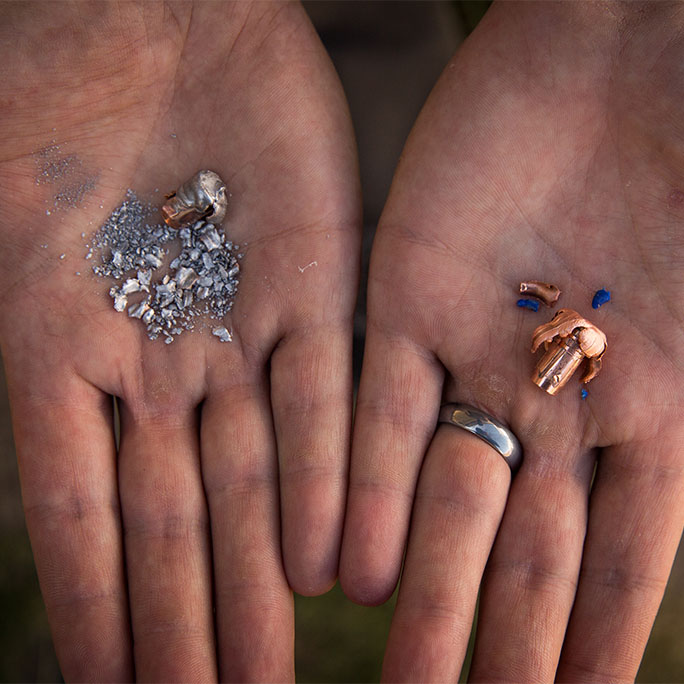
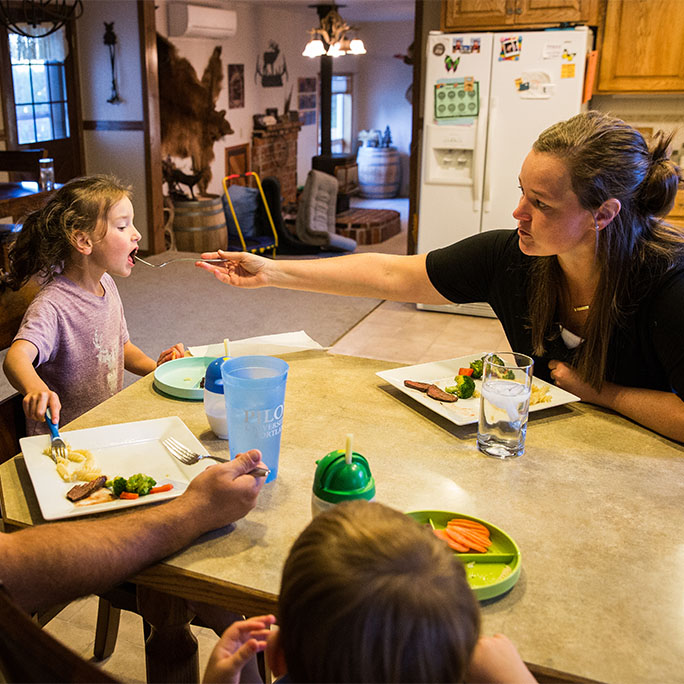
“We as hunters really want to put our best foot forward,” says Tawney. But the use of lead ammunition is a controversial topic. Some hunters swear by it and have been resistant to switching to copper. However, “Chelsea has been instrumental about bringing the conversation about non-lead ammunition to the fore,” Tawney says. And as Cassens continues to spread the word, it shows her commitment to hunting safely, ethically, and in ways that preserve the animal populations on our lands.
Her activism, and her rootsy social media posts about her childhood, her children, the family’s outdoor adventures, and hunting started to bring her celebrity. In 2018, she also became the first ambassador for Artemis, an all-women hunting conservation organization funded by the National Wildlife Federation.
Artemis’s co-founder Jess Johnson says that, as a mentor to women hunters, “Chelsea brings a lightness and ease to things that helps the student relax and feel like it is OK to ask questions (no matter how little). Hunting can come off as an extremely serious thing (because it is...we are talking about life here) and can also be scary to approach as a newcomer. Lightening the mood, bringing an easy yet still ethical and incredibly well-informed teacher into the mix (like Chelsea) basically ensures that the student will keep with it. It’s all about experience: was it fun, was it comfortable, were reasonable expectations set? Chelsea seems to be innate in this.”
Cassens shares her same warmth and ease with new graduate nurses doing their first year of clinicals, as Grande Ronde Hospital’s nurse residency educator, where she “basically helps them debrief their first year of nursing challenges,” she says. “Chelsea is a wonderful mentor to us new nurse residents,” says Justin Heikkila. “She also does a great job of advocating for us to be a part of new experiences we may not have been able to encounter during nursing school.”
IN OCTOBER, BEFORE the pandemic surged for a second time, Cassens got out on a chukar hunting trip with Tanner. They went to the Owyhee Mountains where the terrain is exceptionally rugged. Hiking over mountains of sharp rock without a trail can be grueling, and there’ve been times, since she had kids, that it was for Cassens.
But she has put a lot of focus on her health over the past two years, and she’s feeling physically and mentally solid. Her celebrity helps: you don’t get gorgeous shots of remote wilderness areas without hiking for them. Pictures of her hunting in fields glowing gold in the afternoon sun; of the entire family celebrating a successful pheasant hunt; ones of Brynlee rowing their raft and of Lane and Tanner picking berries populate her feed. Yet for me, two showcase the ethos with which she and Tanner are raising their kids. One of Brynlee gently cradling a wildflower in her hand, and one of Lane in a kids’ size T-shirt that says “Public Land Owner.” “I talk to my children about respecting the land and protecting the Earth. We talk about taking care of things that are special to us. I don’t know if they clearly understand ‘public land owner’ yet, but on a whole, they respect all landscapes we use for our activities,” Cassens says.
Right now, though, with the country in various stages of its second COVID lockdown, her patients in the oncology ward may need her more than her family. It’s a good thing so many of them share Cassens’ love of hunting. “One of my patients is always carrying a fishing or hunting magazine, and I’ll bring in my BHA mag and trade it with him,” she says. “This patient, he’s like 80, yet he’s out hunting and fishing and talking about his favorite elk hunt with his son. He shows me on his iPad the Facebook post his son made about him: This is my dad, newly diagnosed with colon cancer. And this is his elk. His son is so proud.”
It seems if Granddad Loren were around, he’d feel the same about her. But Cassens is too busy to ruminate about such things. She has kids to feed and patients to help and a corner of the country’s most beautiful public lands to defend.
TRACY ROSS is a writer, editor, mother, and outdoors-woman who has spent her life skiing, mountain biking, and rafting, but who has recently started learning to hunt, thanks in part to Chelsea Cassens.